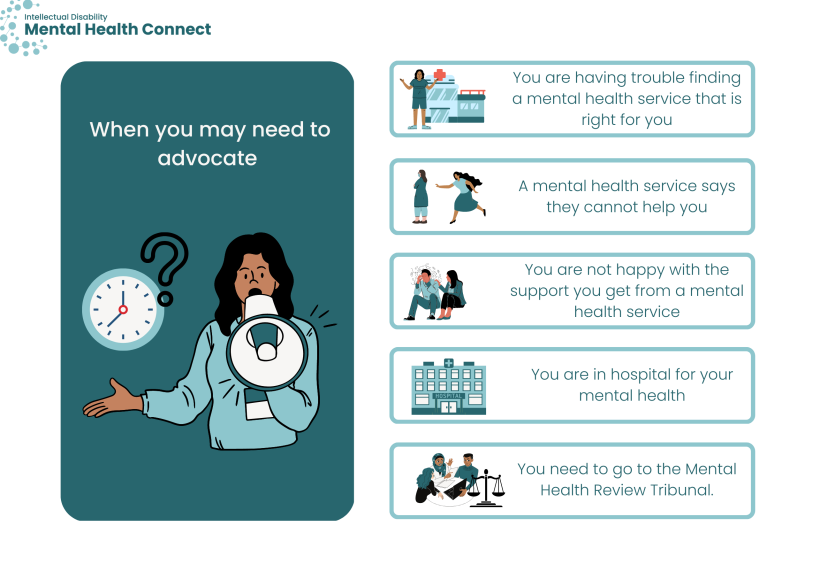About advocacy
Jump to a section below
Advocacy is having your voice heard so your rights and needs are met.
Rights are rules about how everybody should be treated fairly. A right is something everyone has.
You can have needs in many areas of your life.
Here we talk about your mental health needs.
It can be good to spend some time thinking about what your mental health needs are.
An advocate is someone who helps you speak up and get you the support you need.
Times you may need to advocate
- You are having trouble finding a mental health service that is right for you
- A mental health service says they cannot help you
- You are not happy with the support you get from a mental health service
- You are in hospital for your mental health
- You need to go to the Mental Health Review Tribunal. The Mental Health Review Tribunal is a group of people who know a lot about mental health treatment and the law. For more information see Easy Read information about the Mental Health Review Tribunal.

How I can advocate for myself to get support for my mental health
You can be a self-advocate. A self-advocate is someone who speaks up for themselves.
There are ways you can speak up for yourself to get access to mental health services. It can help to know what Your rights are to mental health care.
For example, when you are looking for a mental health service, you can:
- ask if a mental health worker sees other people with intellectual disability
- ask if a mental health worker knows a lot about helping people with intellectual disability with their mental health.
Sometimes it is hard to be a self-advocate. If it is hard for you, you can find an advocate to support you. People with Disability Australia have good resources on self-advocacy. There are also more resources below.
Finding someone to advocate for you
You may want to find an advocate to support you to speak up for your rights when:
- you do not want to do it yourself
- you have tried but it did not work.
You may like to ask someone you trust to help advocate for you. This could be a:
- carer
- family member
- friend
- support worker.
There are also different types of advocates. These can include:
- Peer advocates – people who have a disability or mental health problem who help advocate for others
- Professional advocates – people who are paid to help advocate for people
- Legal advocates – people who make sure your legal rights are looked after and you can get access to mental health services you need. This may be a lawyer. A lawyer is someone who knows about the laws and government rules in Australia. Legal help is when you need support with things to do with the law.
For more details about types of advocacy, see the Disability Advocacy Network Australia.
You can also contact these organisations who can help you find an advocate
- Disability Advocacy Network Australia – Advocate finder They have a list of advocate groups and organisations in each state.
- Voices Together – self-advocacy groups You can find self-advocacy groups in each state on this website.
- They also have Toolkits and resources on advocacy.
- People with Disability Australia can help you to find an advocate – or contact their Wayfinder Hub on 1800 843 929 or [email protected]
- Intellectual Disability Rights Service – A free advocacy service that is available across NSW. They can provide legal advocacy.
- Mental Health Advocacy Service – A Statewide service of Legal Aid NSW that provides free legal information and assistance about mental health.